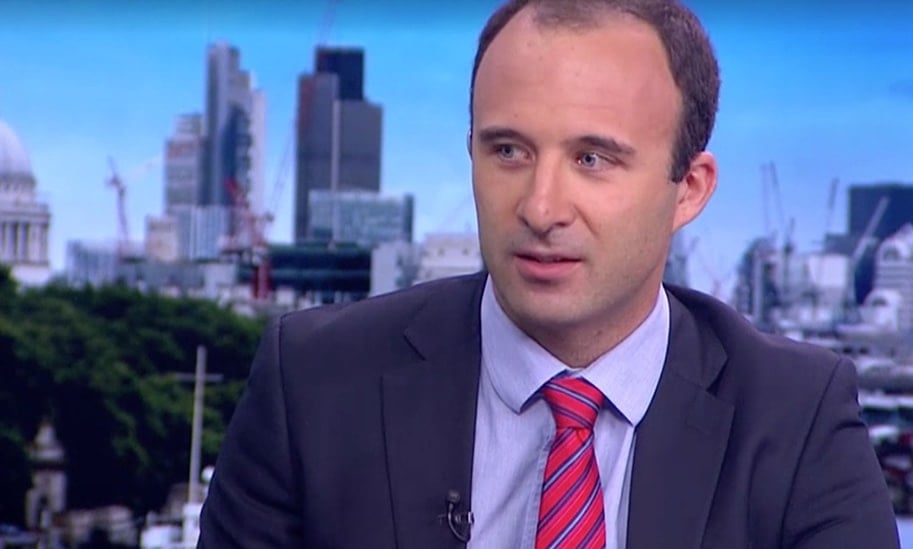"Disruptive Brexit" Key Risk to Pound Sterling says Deutsche Bank's Saravelos
- Written by: Gary Howes
-

Above: George Saravelos, Strategist at Deutsche Bank.
Don't expect a sustainable recovery in the British Pound based on the view the UK might be heading towards a so-called soft-Brexit argue analysts at Deutsche Bank.
The UK political landscape is in flux owing to the weakened position of the governing Conservative party with a clamour of calls being made for the Government to row back on its ambitions ahead of key talks with the EU.
The talk in the City of London and across Westminster is that the UK will be paring back its ambitions in upcoming Brexit negotiations that could see the country settle for membership of the single market and customs union.
The implications for the Pound of this stance are incredibly important with the view being such an outcome would be good for the economy and cuts out uncertainty, which should allow the currency to appreciate.
However there is yet to be any sign of notable strength in the currency at this stage.
If a soft Brexit is good for the Pound, then surely it should be shooting higher?
Not so argues one of the City’s leading foreign exchange analysts.
“Developments over the weekend have provided sufficient evidence to make the muddle-through strategy we outlined our baseline,” says George Saravelos at Deutsche Bank. “We view this development as particularly negative for Sterling and we reiterate our bearish FX view.”
Ahead of the UK vote analysts at the bank warned that the current electoral outcome would leave the overall stance towards Brexit would be softer, but delivery risks would be large.
Risk of a Disruptive Brexit is Rising
We get the sense that those watching the Pound would do well to stop obsessing over the binary terms of hard-Brexit and soft-Brexit.
Rather, it is the process that gets us to Brexit that is important; and for Saravelos the “risk of disruptive Brexit is rising.”
Deutsche Bank tell us that it is becoming increasingly apparent that no political party or grouping has an incentive to change the status quo.
It is argued that the Conservatives are worried about a leadership battle/early election as it would (a) increase the probability of a Labour victory and (b) lead to a likely split of the party itself as it is impossible to reconcile the views among the hard/soft Brexit supporters.
Meanwhile, Labour does not have an incentive to clarify its Brexit position (it remains vague and contradictory with party leaders saying one thing, and the manifesto another).
Labour are best-served by stepping back and allowing the Conservatives to bear the cost of any decision.
“The Prime Minister does not have the political capital to change the existing Brexit negotiation guidelines as she would be at risk of alienating the left or right of the party. The conclusion is that we are highly likely to end up in a period of acute political paralysis in coming months,” says Saravelos.
Yet, the timelines to agree a deal with Brussels are fixed and the more decisions are delayed.
The greater the risk that there is no time left to negotiate something non-disruptive, as suggested by the EU’s chief negotiator Barnier on Monday, June 12.
Saravelos reckons that a paralysed political class in the UK means pressure from the Europeans and/or markets will likely be required to align politics towards a decision.
This could happen either:
(i) via Europeans elevating the pressure even more and threatening “no deal” in the hope of a second referendum or an even friendlier election outcome, or
(ii) via economic and market pressure as uncertainty rises as the Brexit departure date approaches, forcing clarity to avoid a deep recession.
“The key point is that things will probably need to get worse before they get better - without a crisis, negotiations are simply likely to stall until the “hard” 2019 departure date,” says Saravelos.
All of the above increase downside risks to an already gloomy outlook for the UK economy.
But, Softer-Brexit Could Help Longer-Term
Sterling was the market most responsive to the referendum result, and weaker Sterling became the primary transmission mechanism for a Brexit shock via rising inflation and declining real income.
To the extent the risks move in favour of softer Brexit, Sterling could benefit say Deutsche Bank; the more sterling appreciates, the more the real income shock unwinds.
However, there are hurdles to Sterling’s recovery says Saravelos:
First, the near-term political uncertainty is weighing. Second, economic fundamentals like the current account get in the way of sterling appreciation. Third, austerity/policy rebalancing.
All of the above increase downside risks to an already gloomy outlook for the UK economy.
Uncertainty is likely to affect household and corporate spending decisions more than after the Brexit vote because:
a) Article 50 has been triggered and corporate decisions will now have to be based around a worst-case scenario and b) the ability for households to offset falling real incomes via borrowing is now much more constrained with the UK savings rate at a record low and banks tightening lending standards after concerns expressed by the PRA.
Deutsche Bank say this should leave the Bank of England on hold as the Federal Reserve and European Central Bank tighten and push interest rate differentials further against the Pound.
Deutsche Bank had this quarter actually raised their official forecast for Sterling-Euro which saw the Pound to Euro exchange rate at 1.2048 by the end of 2017. This is a EUR/GBP rate at 0.83.

